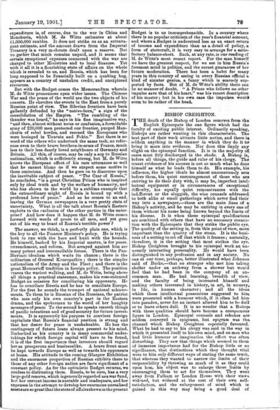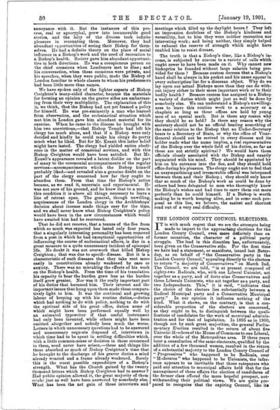BISHOP CREIGHTON. T HE death of the Bishop of London removes
from the English Episcopate the one figure which had the faculty of exciting public interest. Ordinarily speaking, Bishops are rather wanting in this characteristic. The best part of their work attracts little notice, and there ia seldom anything in the manner in which they do it to bring it more into evidence. Nor does this imply any slight on the episcopal function. It is in the majority of cases most fitly discharged in the shade. A Bishop is, before all things, the guide and ruler of his clergy. The truest evidence of his success is not so much what he does himself as what he leads them to do. His example, his influence, the higher ideals he almost unconsciously sets before them, his quiet encouragement of those who are striving to do their duty with, it may be, imperfect intel- lectual equipment or in circumstances of exceptional difficulty, his equally quiet remonstrances with the indfferent or the sluggish, the wise counsels addressed to both alike at small gatherings which never find their way into a newspaper,—these are the main lines of a Bishop's activity, and he may be untiring in every one of them without his name being known beyond the limits of his diocese. It is when these episcopal qualifications are combined with others that have no necessary connec- tion with the Episcopate that they strike the public eye. The quality of the setting is, from this point of view, more important than the quality of the stone. It is the busi- ness of a setting to set off that which it frames ; naturally, therefore, it is the setting that most strikes the eye. Bishop Creighton brought to his episcopal work an un- usually interesting personality. He would have been distinguished in any profession and in any society. Na one of our time, perhaps, better illustrated what Johnson said of Burke,—that no stranger who met him taking shelter under an archway from a shower but would feel that he had been in the company of an un- common man. He had learning, breadth of view, and the faculty of being interested himself and making others interested in history, in art, in scenery,. in life, in human character ; and all the ideas which these intellectual possessions suggested to him, were presented with a humour which, if it often led him, into paradox, never for an instant allowed him to be duly or to leave others dull. It is no wonder that a &shops with these qualities should have become a conspicuous figure in London. Episcopal counsels and rebukes are seldom conveyed in epigrams, but epigram was tha channel which Bishop Creighton especially favoured.' What he had to say to his clergy was said in the way in which it presented itself to his own mind, and on men who had little humour or imagination the effect was often disturbing. They saw that things which seemed to them of immense importance had for the Bishop little or no significance, that distinctions which they thought vital were to him only different ways of stating the same truth, that whereas they wanted to narrow the limits of their responsibility by throwing as much of it as they could upon him, his object was to enlarge those limits by encouraging them to act for themselves. Th-y went away from Fulham or London House with their views widened, but widened at the cost of their own self- satisfaction, and the enlargement of mind which is gained in this way may bring a good deal of annoyance with it. But the instances of this pro- cess, real or apocryphal, grew into innumerable good stories, and the laity of the diocese took infinite pleasure in recounting them. Moreover, they had abundant opportunities of seeing their Bishop for them- selves. He had a. definite theory on the place of social influence in a Bishop's work and the need of recreation to a Bishop's health. Society gave him abundant opportuni- ties in both directions. He was a conspicuous person on the chief occasions when Londoners met to dine ; and his conversation, when these occasions were private, and his speeches, when they were public, made the Bishop of London familiar to whole classes to whom his predecessors had been little more than names.
We have spoken only of the lighter aspects of Bishop Creighton's many-sided character, because the materials for forming an opinion on the graver sides are embarrass- ing from their very multiplicity. The explanation of this is, we think, that the Bishop had not yet framed a policy for himself. He was pre-eminently a man who learned from observation, and the ecclesiastical situation which met him in London gave him abundant material for its exercise. When he came to the diocese he brought with him two convictions,—that Bishop Temple had left his clergy too much alone, and that if a Bishop were only decided and kindly he could make his clergy do pretty much what he liked. But for Mr. Kensit this latter belief might have lasted. The clergy had yielded entire obedi- ence in the matter of occasional services, and with this Bishop Creighton would have been satisfied. But Mr. Kensit's appearance revealed a latent dislike on the part of many to the ceremonial accompaniments of the regular services—accompaniments which the Bishop himself probably liked—and revealed also a genuine doubt on the part of the clergy concerned how far they ought to abandon them. From that time the Bishop's action became, as we read it, uncertain and experimental. He was not sure of his ground, and he knew that to a man in this condition it is above all things necessary to leave a line of retreat open. The general, though unwilling, acquiescence of the London clergy in the Archbishops' decision about incense made things easy for the time, and we shall never know what Bishop Creighton's policy would have been in the new circumstances which would have awaited him had he recovered.
That he did not recover, that a tenure of the See from which so much was expected has lasted only four years. that a singularly interesting personality has been removed from a post in which he had exceptional opportunities of influencing the course of ecclesiastical affairs, is due in a great measure to a quite unnecessary incident of episcopal life. No doubt it was not overwork that killed Bishop Creighton ; that was due to specifie disease. But it is a characteristic of such diseases that they take root more easily in constitutions already weakened by care or anxiety. There was no mistaking the effects of his work on the Bishop's health. From the time of his translation his capacity to bear the burden grew less as the burden itself grew greater. Nor was it the really important part of his duties that harassed him. Their interest and the important issues that hung upon them made these compara- tively light . to him. It was the continual and growing labour of keeping up with his routine duties,—duties which had nothing to do with policy, nothing to do with the spiritual side of his great office, duties some of which might have been performed equally well by an animated typewriter if that useful instrument had only been invented, while others might have been omitted _altogether and nobody been much the worse.
Letters in which unnecessary questions had to be answered and unnecessary requests disposed of, interviews in which time had to be spent in settling difficulties which, with a little common-sense or decision in those concerned in them, need never have arisen,—these and things like these absorbed so much of Bishop Creighton's time that be brought to the discharge of his graver duties a mind already wearied and a frame already weakened. Surely this is the worst possible expenditure of a Bishop's strength. What has the Church gained by the twenty thousand letters which Bishop Creighton had to answer ? Had public opinion allowed it, the great majority of them it-0AL just as well have been answered by somebody else. What has been the net gain of those interviews and meetings which filled up the daylight hours ? They left an impression doubtless of the Bishop's kindness and versatility, but to him they were neither recreation nor interesting work ; and being neither, they simply helped to exhaust the reserve of strength which might have enabled him to resist disease.
The truth is that a Bishop's time, like a Bishop's in- come, is subjected by custom to a variety of calls which ought never to have been made on it. Why cannot new bishoprics be founded without large salaries being pro- vided for them ? Because custom decrees that a Bishop's band shall be always in his pocket and his name appear in every subscription'list for a diocesan object. Why do we lay upon our actual Bishops more than they can do with- out injury either to their more important work or to their bodily health ? Because custom has assigned to a Bishop• a variety of duties which might just as well be done by somebody else. We can understand a Bishop's unwilling- ness to leave this routine work to a secretary or a chaplain so long as these offices are held by young men of no special mark. But is there any reason why they should be so held? Is there any reason why the secretary should not be an official bearing something of the same relation to the Bishop that an Under-Secretary bears to a Secretary of State, or why the office of Vicar- General should not be revived in every diocese and its holder made what the name implies, a real representative of the Bishop over the whole field of his duties, so far as these are not strictly spiritual ? We would have these officials closely associated with the Bishop and exactly acquainted with his mind. They should be appointed by him on his entrance into the See, and they should hold office during his pleasure. The clergy ought not to feel that an unsympathising and irremovable official was interposed between them and their Bishop ; they should only know that so much of the Bishop's work as could be done by others had been delegated to men who thoroughly knew the Bishop's wishes and had time to carry them out more perfectly than he could himself. If a Bishop is worth making he is worth keeping alive, and in some such pro- posal as this lies, we believe, the easiest and shortest road out of a very real difficulty.







































 Previous page
Previous page